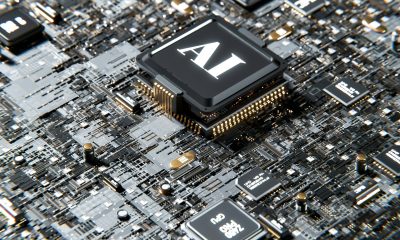Business
Demystifying artificial intelligence in learning
Artificial intelligence is evidently evolving and along with it are learning institutions that benefit from AI.

Artificial intelligence (AI) is not science fiction as is generally perceived due to the surge in the number of Hollywood movies using it as the primary theme. Rather it is a new age reality and has seen many uses over the years in all fields. It is also very crucial to the success of the internet of things.
These days, most of the things in the world run on AI. For example, cars can park themselves, traffic control is automated, Siri can manage our calendars and much more.
Say hello to intelligent learning
Even the field of education and learning has benefitted from the advancement in AI. It is nothing but tasks undertaken by computer systems, which are usually performed by humans with their decision-making abilities and cognitive processes.
Today, AI systems handle degree planning, designing curriculum, building models of in-demand skill sets, and much more. The academic landscape has seen a lot of changes because of advancement in modern technology. And there has been observed a great impact on the performance of the students because of the sophisticated approach to education and learning.
In the field of education, there has been an advent of various innovative systems that include robot writers, analytics, intelligent tutoring, and virtual experiences.
Today, there are several AI-driven tools that help in expanding the opportunities to support learning and teaching. These AI systems seek and respond to data like the humans do and thus allow us to know more about the practical applications in the field of learning.
AI-backed learning systems
Since we live in a digital era, online learning has become more prevalent compared to the offline learning methods. According to a recent study, in the near future, each student will choose a minimum of one distance learning course in their academic careers.
As a consequence, many educational institutions have started inducting AI in their systems for enhanced performance. The AI systems in universities help in redesigning course curriculum in accordance with the prospective employers and job prospects. They also help students choose the degree plan according to their career and educational goals. These systems keep track of students and give them suggestions for improvement.
Such AI systems play an important role as game-changing catalysts:
• AI backed systems generate lots of data to let the teachers know how students learn by analyzing learning preferences
• With the help of collected data, technological experts, along with these institutes and tutors, work to transform their methodologies to increase students’ potential to learn more effectively
AI has brought a lot of changes in the learning system by bringing software, hardware, and online services to the forefront:
• There are several companies that provide home tutoring services to students, as parents want them to be ahead of everyone in the school.
• This has increased the demand for home tuitions and hence numerous start-ups are born in this space. These companies use these AI systems to bridge the gap between a tutor and a student.

Intelligent learning uses learning tools and systems which are backed by artificial intelligence. (Photo by Loughborough University via Flickr. CC BY-SA 2.0)
AI also provides personalized learning experiences to students:
• In a traditional school set-up, it is tough for teachers to identify the students who need special attention. The teacher comes to know about the performance of the students only with the help of their score in an examination.
• On the other hand, in an AI-enabled, data-based approach, students and teachers move forward in an informed manner. This approach tracks a student’s performance with the help of indicators like academic ability level, individual interests, and prior knowledge. This allows for personalized learning and lets students learn at their own speed.
The big data booster for AI
Since access to required data helps companies continuously refine their AI-enabled products, Big Data sees various implications in learning. And, so AI and Big Data seem to have a hand-in-glove relation.
The collaboration offers a real-time learning approach by providing immediate feedback and real-time updates. When tutors get information about the queries from students, they can immediately provide assistance through online forums:
• This data-based approach constantly monitors the students as they interact with the learning material provided. With the help of Big Data, today educators can continuously monitor which strategies are effectively working. This enables them to make frequent changes in their teaching methodologies and adopt different strategies to ensure better results.
• Big Data acts as a booster to AI mechanisms by offering the most well-known LMS metrics that showcases: learning performance of each online learner, collate learners’ feedbacks, and share assessment results. Training software such as ITS (Intelligent Tutoring Systems) today incorporates built-in systems to track a learner’s journey from start to end. As described in the research article on Adaptive ITS for e-learning, this is the future!
• It also allows the institutes and instructors a view into webs analytics, collects and collate feedbacks from surveys, FGDs etc, and offer business reports.
Private tutoring is a powerful tool for learning, but AI has a bigger role to play. It provides access to quality individual coaching to students by selecting instructions from a variety of options and provides solutions accordingly to students.
The AI learning tools function in a more sophisticated manner, allowing teachers and students to work more effectively.
In the coming years, Big Data and machine learning will revolutionize the learning industry. Providing comprehensive information about several learning modes that students prefer and also allowing personalized learning.
Big Data also helps students and teachers interact in a much efficient manner as is suggested through various ways mentioned above. Tutors can respond to queries put in by students at any time, give comprehensive lectures accompanied by virtual reality environments, and offer AI-powered systems of grading.
These new technologies will change the way education is offered as they present knowledge and information in an interesting manner, and engage students to learn.
—
DISCLAIMER: This article expresses my own ideas and opinions. Any information I have shared are from sources that I believe to be reliable and accurate. I did not receive any financial compensation in writing this post, nor do I own any shares in any company I’ve mentioned. I encourage any reader to do their own diligent research first before making any investment decisions.

-

 Crowdfunding4 days ago
Crowdfunding4 days agoPMG Empowers Italian SMEs with Performance Marketing and Investor-Friendly Crowdfunding
-

 Fintech2 weeks ago
Fintech2 weeks agoRobinhood Expands to Europe with Tokenized Stocks and Perpetual Futures
-

 Markets6 days ago
Markets6 days agoThe Big Beautiful Bill: Market Highs Mask Debt and Divergence
-

 Markets4 days ago
Markets4 days agoA Chaotic, But Good Stock Market Halfway Through 2025


























You must be logged in to post a comment Login